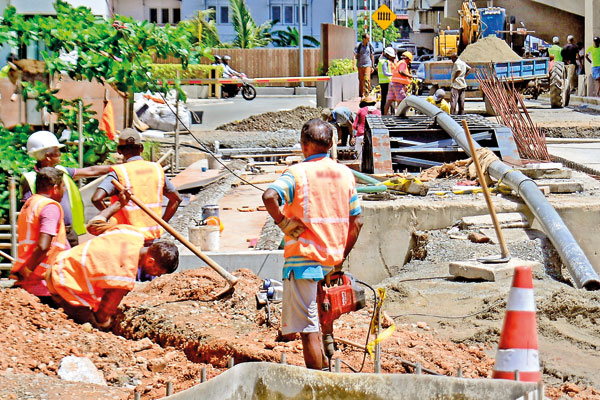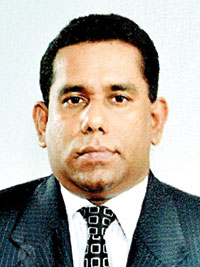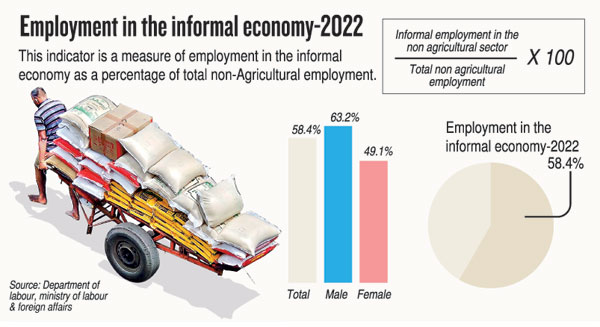News
Decent work, stable family a dream for many in precarious trade zone jobs
View(s):By Ishu Bandara
Sri Lanka’s manpower workers face job uncertainty, which has also caused instability for their families.
Many people from rural areas, drawn to Free Trade Zones and other sectors out of financial necessity, suffer from inadequate wages, lack job security, and have limited access to essential facilities. Most critically, they are often left without a voice to advocate for their rights.
Workers hired by third-party agents are referred to as “manpower workers” and are not employed by the organisations they work for.

Workers at a construction site. Pic by Eshan Fernando
Piyuma Prabodhini, who came from Embilipitiya to work in the Katunayake Trade Zone eight years ago, told the Sunday Times: “I work through a manpower agency due to health issues that prevent me from securing a permanent job. Shortly after starting, I realised there’s little focus on safety or job security. I once fell at work and needed a hip replacement, yet neither the factory nor the agency offered first aid, compensation, or any guidance, leaving me to cover my medical expenses. After the injury, I was jobless for nearly a year, facing financial struggles without any support from the agency or employer.

Commissioner General of Labour H.K.K.A. Jayasundara
“There’s no law protecting manpower workers, even though we do the same work and contribute just as much as permanent employees. We are paid by piece rate, with deductions if targets aren’t met, and raising concerns risks job loss. Although manpower workers are more common than permanent employees in the Free Trade Zone, we lack job security, benefits, and protections like health insurance, EPF, or ETF.’’
This revision clarifies issues with job security, safety, and the lack of worker protections in manpower agency employment, highlighting the disparity between permanent and temporary labour conditions. Manpower workers do not receive any contract from the agency, or from the companies they work for. There are no responsible parties to uphold their rights and benefits.
Sridaran Nilani, also a manpower worker, employed in a factory in the Katunayake Trade Zone since 2018, shared her experiences.
“ As a garment worker, I came from a rural area with dreams, but life here on a factory wage is hard. Finding stable boarding is tough; when there is flooding, we’re forced to move. We lose wages. Factories rarely consider our well-being when we’re sick, leaving us to manage alone,’’ she said.
“As a Tamil, saving for essentials like gold jewellery feels impossible; saving Rs 2,000 monthly still means years to reach my goal. I arrived with hopes of buying land and a motorbike, but those dreams have faded. Due to the loan from the factory, our income is reduced to such an extent that some people skip meals. Language barriers also add to the challenges. I’ve often cried alone after sensing insults in Sinhala. I suffer from seizures, yet even after fainting, they only allow a brief rest before I’m required to work again.
“We face many unresolved issues and lack the respect that other workers receive. As a Tamil and a trade zone worker, I ask for the protection of our rights and the respect we deserve.’’

For nearly 20 years, most private sector companies have used manpower agencies to recruit temporary workers, such as janitors. Now they are recruiting machine operators and managers. While there are agreements between manpower agencies and the companies, such agreements are not disclosed to the workers.
“They asked me to fill out an application before I started work, but they didn’t give me any contract to sign. I’m also not enrolled in the Employees Provident Fund,” a worker recruited through a manpower agency told the Sunday Times.
Most manpower employees are hired on a daily basis and transferred to various companies under different job categories, depending on employer requirements.
Many of these workers are from rural areas and have limited knowledge of labour laws. The entire process is managed by the manpower agencies, which pay little attention to employee rights, and employees receive their wages only after the agencies deduct their commission. Neither salary slips nor enrollment in the Employees Provident Fund are provided to the employees.
Commissioner General of Labour H.K.K.A. Jayasundara told the Sunday Times: “An employee is entitled to EPF membership from the first day of employment, and it is the employer’s responsibility to ensure the employee is enrolled. The nature of the job is irrelevant; all employees, regardless of employment type, are eligible for membership.
“All employees should be enrolled in the Employees Provident Fund regardless of whether they are permanent, temporary, apprentices, casual, or shift workers. This includes employees working on a piece-rate, contract, commission, work-performed basis, or in any other capacity. ‘’
The Shop and Office Employees (Regulation of Employment and Remuneration) Act No. 19 of 1954 outlines labour laws in Sri Lanka. The key provisions in the Act include the minimum age of employment, minimum wages, regulation of working hours, holidays, meal breaks, sanitary and washing facilities, record-keeping, maternity benefits, and payments. This Act applies to all employees working in shops and offices in Sri Lanka, including manpower workers.
However, manpower workers in Sri Lanka report being treated differently.
While public sector employees work eight hours per day, they are required to work nine hours. They are not granted the 14 days of annual leave stipulated under labour law, receiving only seven days instead. Employers also avoid providing gratuity or offering permanent employment, as these workers are transferred among various agencies throughout their employment period.
Mr. Jayasundara, said: “The current compulsory national minimum wage in Sri Lanka is Rs 21,000 per month.
“Anyone who works in the private or semi-government sector, or is represented by a union, can file a complaint with the Department of Labour. Anyone needing to file a complaint against a company violating labour laws can visit a regional office, located in every district, or come to the head office as well.
“We provide facilities for filing complaints in Sinhala, Tamil, or English, and complaint forms are available free from the head office, regional offices, or the website. Complaints can be lodged in person, sent by post, email, or fax. Additionally, we now have an online system called the ‘complaint management system,’ on the website.’’
Mr Jayasundara, emphasised that if anyone is dissatisfied with the settlement provided by the regional head office, they may approach the Commissioner General of Labour for a review. If necessary, it will then be referred to the Department of Labour’s Special Investigations Division.
The best way to say that you found the home of your dreams is by finding it on Hitad.lk. We have listings for apartments for sale or rent in Sri Lanka, no matter what locale you're looking for! Whether you live in Colombo, Galle, Kandy, Matara, Jaffna and more - we've got them all!

